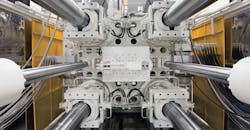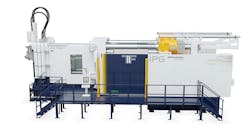Making HPDC a Customizable Process
High-pressure diecasting has been embraced by automotive designers, principally because of their adoption of lightweight aluminum alloys for structural and drivetrain components as the means to reduce vehicle weights. Closely following this shift has been the opportunity that advanced design capabilities offer designer to reconsider system components, to unitize structures, and again HPDC is the means to the end.
With high-pressure diecasting metalcasters not only fulfill these automaking objectives but also produce such lighter, more complex, and unitized components in less time and with less energy, material, manpower, etc.
A consequence of all this has been the arrival of new HPDC machines, often capable of producing large and complex cast parts. A notable entry among these machines is the Toggle Free (TF) series developed by ItalPresseGauss – an Italian machine builder and part of the Norican Group of companies.
TF series machines feature a hydraulic system to drive the press closing action rather than a mechanical process. An advantage of hydraulic power is that the machine needs just two platens (not three) to achieve the pressure necessary to form the parts, which reduces the machine footprint. That point is important because producing larger-dimension parts calls for a higher reliance on automation and handling equipment to tend the HPDC process.
The latest addition to the TF series are modular models that can be configured easily to the specific requirements of particular metalcasters, and also adaptable to the changing casting requirements. ItalPresseGauss indicated that more than fifty-five different machine configurations will be possible, along with closing forces ranging from 1,400 to 11,000 metric tons, six types of injection, and at least two closing unit options for every machine size.According to the developers, the flexibility that the modular TF machines offer to foundries will lead to greater cost-effectiveness, including the opportunity to cast larger structures in higher volumes.
“Their modular configuration means we can ship the pre-tested, pre-certified modules quicker, at less cost, and assemble on location ensuring faster delivery and ‘right-first-time’ performance,” offered IPG senior vice president Mario Cincotta. “All concepts we have tested in real life. What’s more, if casting needs change, so can the configuration of the machine by re-adapting it with a new module. It’s simple. That’s why we call it SmartPlatform.”
IPG is supplying the new TF models as individual machines or as parts of fully automated cells.
The developer also calls customers’ attention the new machines’ contribution to “sustainable productivity,” in line with the environmental scoring standards increasingly imposed by casting buyers. TF machines themselves are designed to be lightweight, and incorporate the developer’s ECO-FIT “smart” system to regulate the hydraulic pumps’ operation, to consume less energy. Fluid flow-rate and pressure request are compared in real time with the target values, to minimize the flow waste; and maximum hydraulic efficiency is achieved by reducing the motor speed to the minimum rate required for requested pressure.
Automatic speed variation combined with reduced pressure in the circuit achieve a significant overall reduction of energy consumption per cycle.
Other design details include hard, certified alloy-steel platens, well equalized tie-bar loads, a hydraulic locking system able to compensate for die geometrical variances or thermal expansions, and a SC.4 shot end system with real-time injection control. Such details help to promote casting repeatability and minimize aluminum waste.
The new modular TF machines are invested with the Norican Group’s Norigate digitalization platform, which collects, timestamps, and encrypts data from any machine before sending it to the cloud.
“The launch of our leaner, greener, next-generation of TF machines means we are going to be able to deliver best-in-class parts and solutions in less time, helping customers to increase productive time and to adapt quickly to changing requirements,” according to Cincotta.

